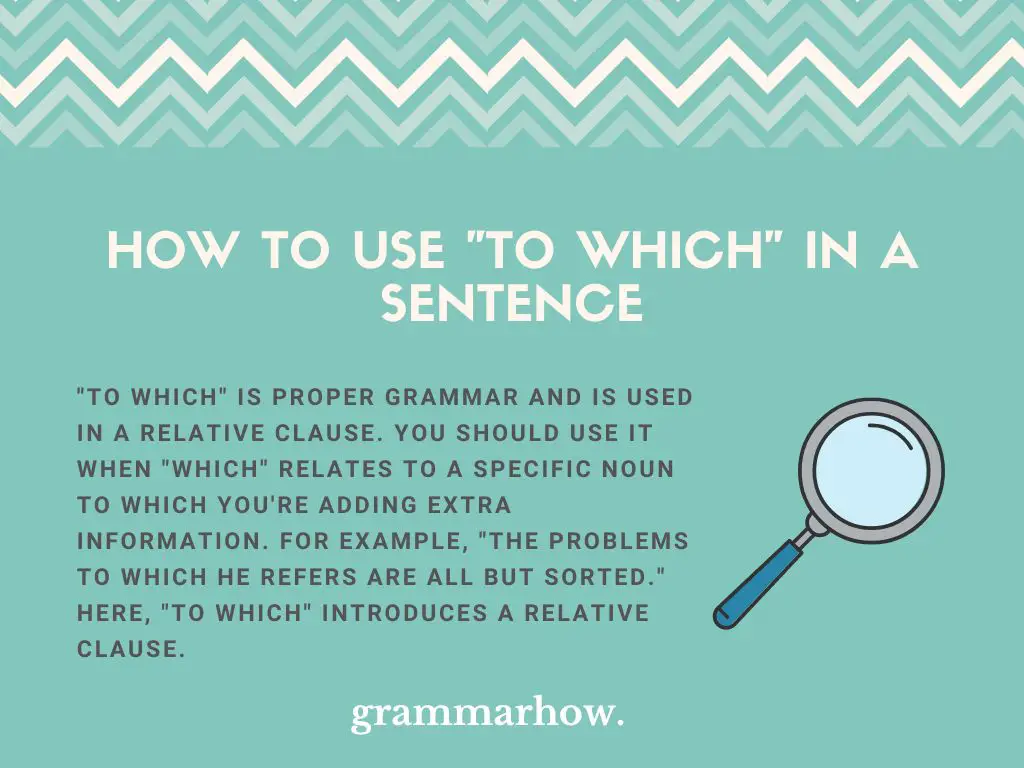“To which” is a common formal phrase in English. When used correctly, it shows you grasp formal English rules as you have left the preposition “to” in the middle of the sentence rather than at the end. This article will explain all you need to know about using “to which.”
How to Use “To Which” in a Sentence
“To which” is proper grammar and is used in a relative clause. You should use it when “which” relates to a specific noun to which you’re adding extra information. For example, “the problems to which he refers are all but sorted.” Here, “to which” introduces a relative clause.

KEY TAKEAWAYS
- “To which” is part of a relative clause. You should use it as the first word.
- “To which” is a formal phrase used to replace “which… to,” where “to” ends a sentence.
- You should use “to which” to modify a specified noun earlier in the sentence.
Here’s another quick set of examples to help you with it:
- I’m going to need to refer to the medical study, to which I should have a better understanding of what comes next.
- This is the painting I created, to which I spent a lot of my time figuring out my talents.
“To which” is a formal alternative to using “which… to” in a relative clause. Informally, you might find the following:
- She was talking about the apes, which she took a liking to.
Here, “which” introduces a relative clause but is not “proper” English. You should try to avoid ending sentences with prepositions like “to,” meaning you have to bring them forward.
Instead, you might find the following works better in formal writing:
- She was talking about the apes, to which she took a liking.
This sentence shares a meaning with the previous example. “To which” allows it to sound more formal as “to” comes at the start of the relative clause rather than the end.
Can You Start a Sentence With “To Which”?
“To which” is the first part of a relative clause. As such, you should avoid starting a sentence with it. It does not make sense at the start of a sentence because it cannot modify an earlier noun.
To use “to which” correctly, a noun needs to come earlier in the sentence. For example:
- This is the question to which I’m sure there are many answers.
“To which” modifies “the question” in the above example. You cannot write it like so:
- Incorrect: This is the question. To which I’m sure there are many answers.
“To which” does not work at the start of a sentence. It should not be the first phrase in an independent clause.
This is because “to which” is a relative clause, meaning it could be removed, and the original sentence would still make sense.
- This is the question.
However, removing an independent clause from your writing should mean that you lose context or something doesn’t make sense. Therefore, you cannot treat “to which” as an independent clause.
Comma Before “To Which”?
You should place a comma before “to which” in certain instances. It is best to include a comma before “to which” when introducing new information that does not need to be a part of the main sentence.
The comma helps the reader to pause before going into the relative clause. You should include it like so:
- This is the problem I face, to which I’m still trying to figure out the best solution.
Here, “to which” comes after a comma to help it stay as a relative clause. The comma indicates that you may remove the “to which” clause from the sentence, which would still be correct.
Can You Use “To Which” in the Middle of a Sentence?
“To which” should be used in the middle of a sentence in almost every situation. You should place “to which” in the middle of a sentence because it adds more information to your writing, meaning it has to come after a noun.
- I’m not sure about the things to which he speaks. I’m worried he’s gone a bit crazy.
- You should look into the sculptures, to which there are a few great things to learn.
You should not include it at the beginning of a sentence because it does not modify a noun. You also shouldn’t end a sentence with “to which” because it defeats the purpose of bringing the preposition “to” into the sentence.
Can You End a Sentence With “To Which”?
You should never end a sentence with “to which.”
Remember, the whole point of using “to which” in a relative clause is to stop yourself from ending a sentence with “to.” You should also avoid ending a sentence with “to which.”
There are no appropriate situations where a relative phrase like “to which” makes sense at the end of your writing.

Martin holds a Master’s degree in Finance and International Business. He has six years of experience in professional communication with clients, executives, and colleagues. Furthermore, he has teaching experience from Aarhus University. Martin has been featured as an expert in communication and teaching on Forbes and Shopify. Read more about Martin here.
